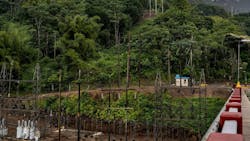Study: Puerto Rico Could Achieve 100% Renewable Power Grid By 2050
According to the Puerto Rico Grid Resilience and Transitions to 100% Renewable Energy Study (PR100) by six Department of Energy national laboratories and Puerto Rico stakeholders, the region is expected to achieve a 100% renewable power grid by 2050 with the help of solar and wind power, energy storage, and advanced extreme weather impact modeling.
Pacific Northwest National Laboratory researchers led much of the resilience and reliability modeling for the study. The study is funded by the Federal Emergency Management Agency and managed by the Department of Energy’s Grid Deployment Office.
One of the study’s portion simulated a future renewables-based power grid using the Electrical Grid Resilience and Assessment System (EGRASS) model with 100 hurricanes to analyze the system recovery after severe damage with the Recovery Simulator and Analysis model. They also studied grid-forming inverters to help create a more reliable grid.
The results highlight both near- and short-term strategies for Puerto Rico to build a resilient, reliable grid in the face of major hurricanes and natural disasters. They stress on deploying renewable energy generators such as rooftop solar panels, the critical need for energy storage to stabilize the grid in case of a disruption in energy generation and enhanced extreme weather impact modeling to prepare for hurricanes.
About the Author
T&D World Staff
Content Team
Nikki Chandler
Group Editorial Director, Energy
[email protected]
Jeff Postelwait
Managing Editor
[email protected]
Christina Marsh
Senior Editor
[email protected]
Ryan Baker
Associate Editor
[email protected]
Amy Fischbach
Electric Utility Operations
[email protected]
Rich Maxwell
Community Editor
[email protected]
Gene Wolf
Technical Editor
[email protected]
